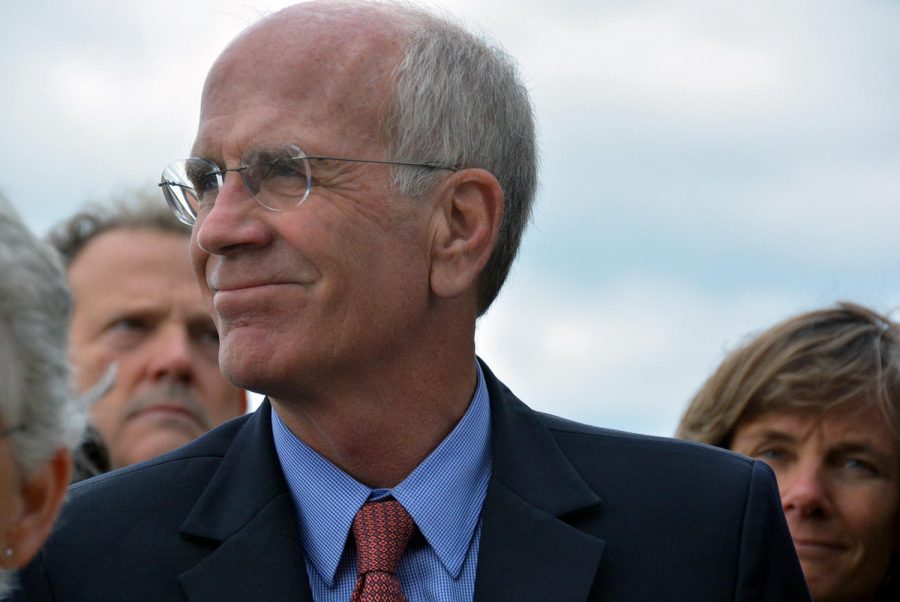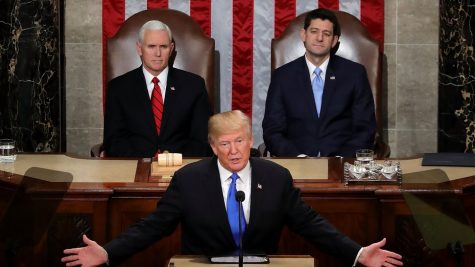Welch’s Visit From A History/Politic Major’s Perspective
For a History and Politics student, I spend a comparatively small amount of my time focused on what the people in Washington are up to. Like everyone in this country, I have my own views on politics and the state of the US government, but consider myself neither a Democrat, Republican, or independent, and as a rule I don’t like politicians, so I was a little nervous on how this would be reflected in my article.
I should have realized that I wasn’t alone. Representative Peter Welch made his presence known at the front of the room: as Dr. Merges’s showered gratitude, Welch cut her short, saying he wasn’t quite sure why SVC was excited for the presence of a congressman, quipping “everyone hates us” (and indeed they do). If you ask any lay person on the street how they feel about Congress, they probably wouldn’t have anything very positive to say (Welch told us that congress’ approval rating stands at something like 9% after he introduced himself). As I watched Rep. Welch standing before the SVC audience, it was hard to see why Congress’ approval rating is so low. He was not dressed in the typical suit and tie common to the politicians we see on tv; rather, he was dressed quite casually, fitting in with the business casual attire we see among most members of the working class. This air of accessibility was pretty consistent for the duration of his time here.
Settling into the purpose of his visit, Welch began with a brief explanation of his history and how this related to the topic of the day: criminal justice. Welch got his start as a public defender, giving his words on the topic a sense of conviction. Listening to him, I could feel how much his time working with the justice and prison system has gone on to help shape his politics, and areas like this is where he had the most to say. Questions ranged from prisons and alternatives to incarceration. These were met with drug statistics and an underlying feeling that drugs equal crime. He said the 90s set the country up for an era where “everything became criminalized”, filling our prisons as a result when there was most definitely a better and more effective option to incarceration. He summed up his position by commenting that most incarceration “doesn’t work.” Questions on healthcare and the healthcare reform were met with similar answers; they reflected his history and politics. Answers he gave on these topics resembled statements he made when he announced his intention to introduce legislation requiring drug companies to lower costs for seniors earlier this month (video here: https://youtu.be/xU25Jq6aVbs). Similarly, what he had to say on climate change likely resembles what he is pushing for in his spot as a member of the Energy and Commerce Subcommittee.
This is not to say that he didn’t have an answer for other topics, such as the cost of education, but what he did have to say was the same thing that we have been hearing from everyone: college is expensive. Most democrats would like costs to be cut, but right now there isn’t any plan in place to make it happen. Congressman Welch seemed just as frustrated as the rest of us with college debt stacking up, but frustration on top of frustration doesn’t give one a sense of relief. During these questions I was left wondering if VT’s only member of the House of Representatives doesn’t know what to do about it, then who does?
All of this aside, what I found the most interesting about Welch’s comments was how incredibly critical of the government he was. When he was asked a question regarding health care, Welch responded with a list of reasons for why Congress is so messed up. He painted an image for the audience of hypocrisy, inadequacy, and overall incompetency in Congress’ ability to make a decision, carry it out, and stick to it. This criticism did not exclude himself. In fact, he appeared to outright accuse himself as he explained the passing of the Healthcare Reform Act and his part in repealing it. He implied that the reason why it was passed was simply because after 27 hours, they (the committee) were all tired and just wanted to get out of the room. Afterwards, while I was doing a little follow-up homework so that I may provide a fair assessment, I discovered that he is on the Committee of Oversight and Government Reform, and it is quite literally a part of his job description to be critical of the workings of the US government. Nevertheless, I was impressed with his self-awareness and forthrightness in owning up to being part of what many are considering a broken system.
As the questions came to an end, and the Congressman bid us farewell, I couldn’t help but think that in many ways he was a typical politician. He said a lot without saying much, and what he did say suggested he placed at least partial blame for the problems in our country on his republican colleagues. But something Dr. Merges said when Welch arrived that afternoon stuck out: he is one of 435 Representatives in Congress, representing 322,000,000 people, and despite this, he came to address the concerns of a small crowd of SVC students and staff. Maybe this should be expected, but I have to wonder how many other politicians in this country would do the same?
For the summary of the questions Congressman Welch answered, see “Congressman Welch’s Visit to SVC“.
Photo belongs to VPR.com












